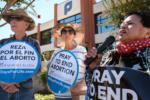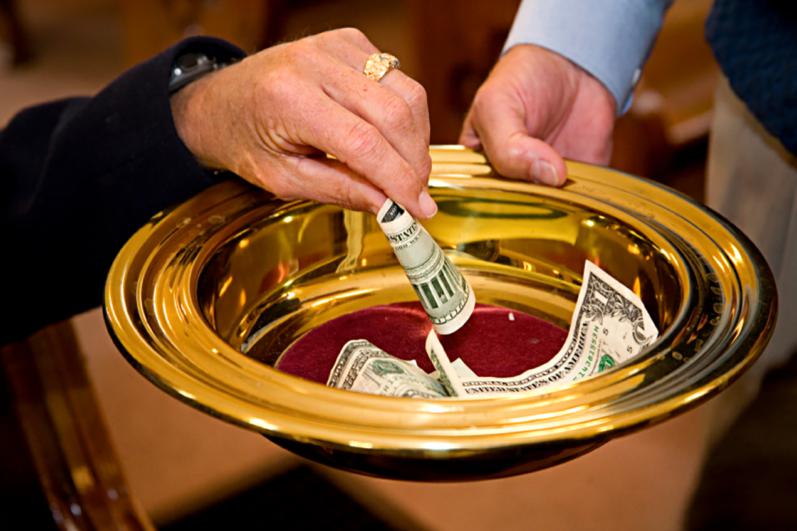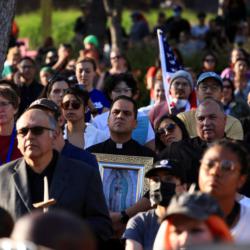Are Catholics obliged to tithe?
Because I am an ethicist in a business school, and the author of "Be Good Bankers: The Economic Interpretation of Matthew's Gospel," Catholics write to me with questions of money in relation to their faith.
A question often raised is whether Catholics are obliged to tithe, and, if so, should they do so from gross income (pre-tax) or net income (post-tax).
Catholics tend to use the word "tithe" incorrectly, meaning "to give away 10 percent." But strictly, a tithe is what we owe in justice to clerics and religious for their support and to the church in general for divine worship and the holy assistance it gives us. That amount was fixed at 10 percent in the Old Testament. However, as St. Thomas explains, in different times and places it can be a different amount (ST, II-II, 87, 1). For instance, today, in a newly-founded parish, or in an old parish with serious deferred maintenance issues, the obligation to "tithe" may imply a claim of far more than 10 percent on the earnings of its most prosperous members.
As regards almsgiving, or "giving to charity," there is no percentage of giving that Catholics must observe. Rather, there are many good rules of thumb, such as Newman's (never spend any money yourself, except incidentally), or Mother Theresa's (you should give until past the point of where it hurts).
I admit that as a kind of objective test, it can help to apply a bright-line standard and see whether one is giving 10 percent away to charity. But then let's return to the question of gross versus net. Which income should be the basis for that 10 percent? The difference between the two can be immense. Most households that pay tax at all are paying 50 percent of their gross income to some taxing authority or another. Therefore, if they aim to give 10 percent of gross income, they will need to give away twice as much as if they were giving from net!
Giving away 10 percent from gross, then, looks much more demanding at first glance. But maybe it's not. The reason is that, once we make as our concern the disbursement of our gross income, then we must look to its use by the government, too, which takes from that income for its own purposes. Should any of those purposes count as "giving to charity," or at least be reckoned "as good as charity?"
The IRS explains on its website, "The current tax rate for Social Security is 6.2 percent for the employer and 6.2 percent for the employee, or 12.4 percent total. The current rate for Medicare is 1.45 percent for the employer and 1.45 percent for the employee, or 2.9 percent total." This sums to 15.3 percent. These are called "payroll taxes." But as regards the regular, progressive income tax which you and I pay on earnings, about 5 percent of your earnings will additionally be taken to pay for Medicaid.
Social Security, Medicare, and Medicaid are frequently defended by religious leaders and Catholics as expressions of Christian principles. Social Security is not a savings account but a pyramid scheme. The money that earners pay into the system goes just about directly to the recipients. It's not a distortion to say that a Social Security deduction goes straight from my paycheck to the pocket of someone who is a stranger to me, to support him or her in old age. A Medicare deduction, similarly, goes straight from my paycheck to pay for the medical care of a complete stranger. These programs, then, might fairly be represented as "government-mediated almsgiving." If so, then most wage earners who pay taxes already well satisfy the standard of 10 percent of gross.
At first it looked like it would be difficult to give away 10 percent of gross income. But now we see that we are already giving away twice that much, to government-designated beneficiaries, with the government as a mediator.
Also, it looked as though the natural justice claim of clergy and religious to be supported by the laity competed only with the laity's own expenditures, and the question that a layperson needed to pose was, "Am I being generous enough in tithing?" But now it looks like two different claims are imposed on the laity: one is compelled by government, to support strangers; while the other is suggested by natural law, to support one's own parish, clergy, and church. These claims come into direct, practical conflict if the government's taking makes it difficult or impossible for the laity to support the church appropriately.
We have not even looked at the most difficult issue here. Each year, the Federal government spends $2.4 trillion on Social Security and Medicare. But it collects only $1.7 trillion in payroll taxes for these programs. (Source: www.cbo.gov/publication/61181). If these programs were to be "honest" and actually collect the money they go on to spend, payroll deductions for them would need to increase from about 15 percent to about 21 percent of earnings. Likewise, Medicaid taxes would need to be roughly doubled.
That is, if these programs were "honest," the total tax burden (over 30 percent for these alone, in addition to income tax) would certainly crush and crowd out many prior obligations that taxpayers have according to natural law.
Meanwhile, we carry on, debasing the U.S. dollar all the more, shoving the annual deficit onto the national debt, and borrowing money from China to pay for it, while politicians and "common good conservatives" alike say not a word.
- Michael Pakaluk, an Aristotle scholar and Ordinarius of the Pontifical Academy of St. Thomas Aquinas, is a professor in the Busch School of Business at the Catholic University of America. He lives in Hyattsville, MD, with his wife Catherine, also a professor at the Busch School, and their eight children. His latest book is "Be Good Bankers: The Economic Interpretation of Matthew's Gospel."



















